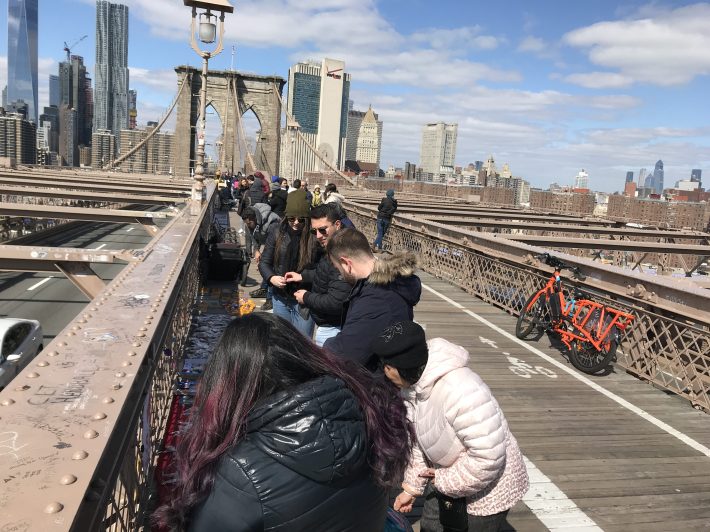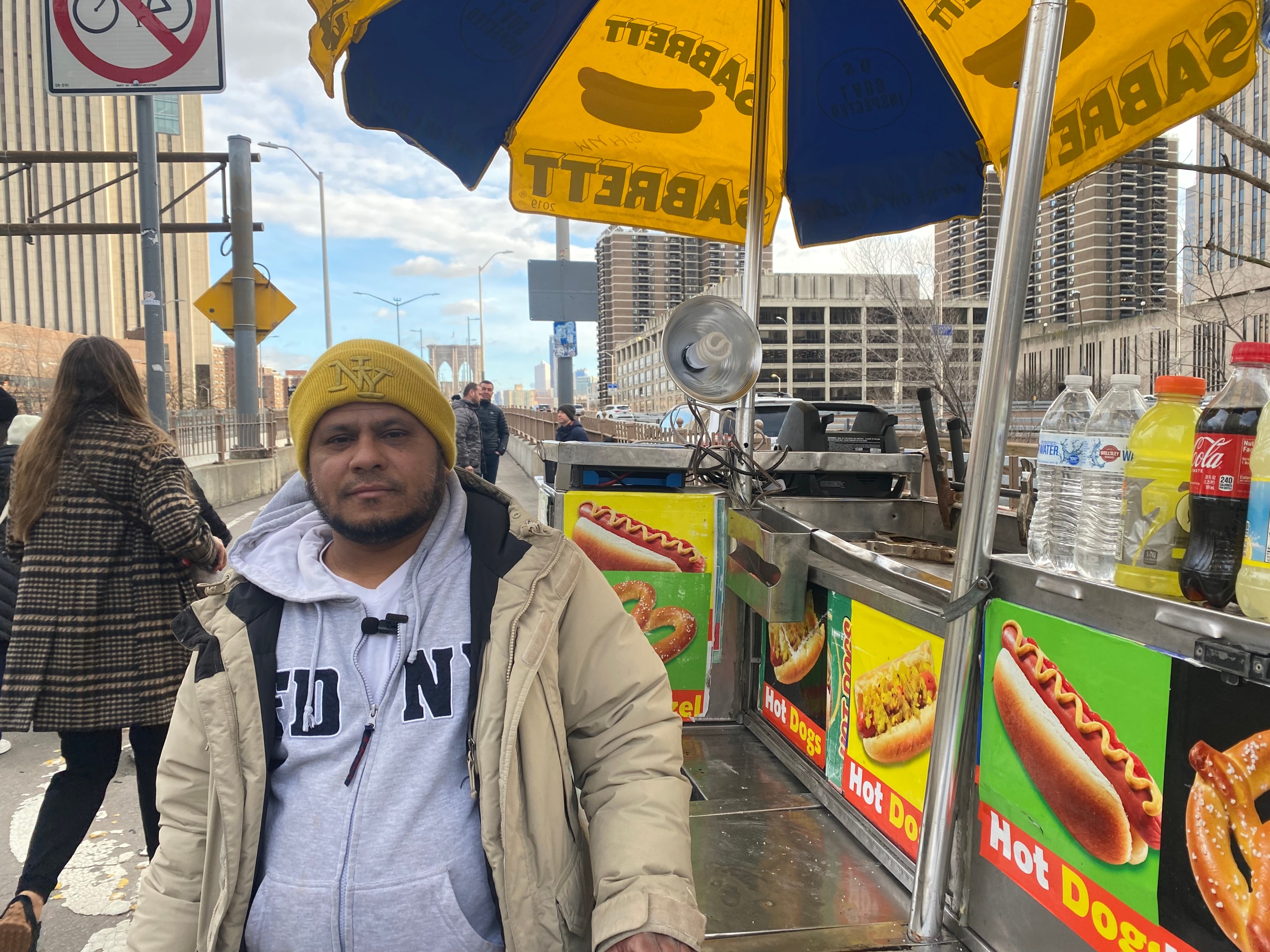The city booted vendors from the Brooklyn Bridge walkway and has started deploying regular police patrols to stop them from setting back up on the busy pedestrian path — and the removal orders came straight from Mayor Adams, sellers told Streetsblog.
Late in the week leading up to the Martin Luther King Jr. Day weekend, NYPD officers from the local Fifth Precinct arrived at the bridge's bustling footpath telling them to move out, standing in front of their tables until they packed them up, according to the vendors.
One man who for six years has been selling Big Apple-themed merchandise like magnets, key chains, and art — but who declined to give his name for fear of getting in trouble with the authorities — said cops cited overcrowding as the reason for the sweep, and officers noted the directive came straight from the top.
"First thing he said was, ‘The mayor wants this’” said the vendor.
He tried setting up again several times over the weekend and the following week, but officers stationed at the foot of the bridge quickly arrived to tell him he couldn't do business there anymore.
"They had a patrol here this morning, stayed there three hours — I’ve never seen it like that," the vendor said.
NYPD kept the bridge clear in the following week and sellers and advocates gathered on the Manhattan side Friday to assess the situation. Both slammed the mayor for cracking down on the outdoor markets, while failing to better regulate the increasing amount of stalls selling souvenirs and snacks on the world famous overpass.
Cops busted some longtime mainstays from the bridge — even those with licenses — like M.D. Rahman, who has been selling hot dogs and $1 water near the entrance since 2003. (His recording "One dollar for the water!" playing on repeat has become as iconic as the Brooklyn Bridge view itself.)
"I never got problems with police like the situation they come last week," Rahman told Streetsblog Friday.
Police told him to move or risk losing his chrome-plated food cart, according to Rahman. The city's actions have cost him more than a week's living, he said.
"I want to take care of my family, I want to take care of my little son, little kids. I am not doing crime over here," he said.
The mayor has stepped up enforcement against street vendors, many of whom can't get licenses from the city because of a decades-old cap on food selling permits.
There's been a surge in sidewalk entrepreneurs setting up shop along the popular bridge's pathway this year, amid a resurgence of tourism and after former Mayor Bill de Blasio gave more room to pedestrians on the cramped boardwalk by moving cyclists who used to share the space onto a new bike lane in the roadway in 2021.
Some vendors started spreading out too much, taking up a lot of space on the cramped boardwalk, said Temzin Norbu, who's been selling New York-themed pictures for three years.
"More and more came here. I think that’s why someone complained," Norbu said. "Some people don’t follow the rules. Very greedy, you know."

But city officials have also done a poor job of regulating and educating the increasing number of vendors, according to an advocate.
"If there are certain concerns, they should really meet the vendors and have a conversation with them and try to address the concerns," said Mohamed Attia, a former vendor who now leads the group the Street Vendor Project.
The group estimates there are some 20,000 street vendors in the city, but the city has a cap of 3,000 citywide mobile food vending permits, another 1,000 for seasonal setups, and 1,000 more for fresh fruit and vegetable carts, meaning many sell illegally or pay document holders in an underground market to rent the papers.
The city was supposed to add 445 new licenses a year for 10 years starting last July under a 2021 law, but Attia said officials have yet issue any to vendors.
Meanwhile, city inspectors have doubled ticketing during Adams's first nine months in office compared to pre-pandemic, and the NYPD has become the city's main enforcer, despite de Blasio having pledged to move that responsibility to the Department of Consumer and Worker Protection.
"You're investing so much into enforcement," Attia said, "and you're not investing in creating the new system that a lot of people are waiting to get one of those permits to formalize their business."
There have been high-profile vendor arrests under the Adams administration, as when transit cops cuffed and strip-searched a woman with a pushcart at the Broadway Junction subway station in Brooklyn last year. The mayor defended the move at the time, saying, "We have to follow the rules."
Horrific treatment of Maria, a mother, immigrant entrepreneur & her *daughter* who filmed
— Street Vendor Project (@VendorPower) May 7, 2022
Earlier this week, Maria was arrested for selling mangoes & kiwis to customers she's served for 10+ yrs
Shame on our city for choosing cruelty, instead of supporting hardworking mothers pic.twitter.com/sjonO5FMjM
NYPD officers also did a big bust of street vendors selling knock-off luxury goods along Canal Street two months ago.
Street vendors are required to have different licenses depending on whether they sell food or other goods, and they can't set up on sidewalks unless there's at least 12 feet of space, and they're not too close things like bus shelters, building entrances, or crosswalks.
But the Brooklyn Bridge is basically a city street that nonetheless doesn't have any of the siting concerns such as bus stops or hydrants, and its heavy tourist traffic makes it an ideal place to sell goods, said Attia.
"It’s one of the very rare city streets that you can be in compliance with all the citing rules and regulations," he said. "It’s a really disappointing approach from the city agencies to see them addressing some sort of concern with the vending on the bridge to just ask people to leave regardless of what the law says."
City Hall and the NYPD declined to comment.






